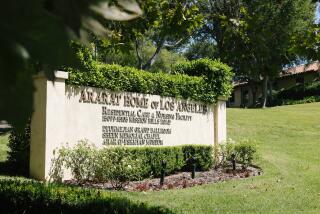S.F. Hospital AIDS Policy Is Adequate, State Tells 4 Nurses
SAN FRANCISCO — Quashing complaints by four nurses at San Francisco General Hospital, the state’s health and safety agency ruled Friday that this city’s sprawling public medical center is adequately containing the spread of AIDS.
In a brief statement issued in advance of its formal findings, the state’s Occupational Safety and Health Administration concluded that it “did not find any violations of any existing occupational health and safety standards.”
“We feel this (decision) is very important,” said Dr. David Werdeger, the hospital’s executive administrator and director of public health for the city, “because we realize, without being self-congratulatory, that San Francisco General Hospital is a model (AIDS-care) facility that is copied by community hospitals around the country.”
Werdeger pointed out that only four of the hospital’s 800 nurses complained, and they were not assigned to the AIDS program.
However, Claude Wyle, one of the nurses’ attorneys, said the Cal-OSHA statement is “ambiguous” and “doesn’t give a fair picture” of concessions made by the hospital.
Among those concessions is the hospital’s pledge to improve its educational programs for nurses to help them understand the latest information from the federal Centers for Disease Control, which is extensively studying the spread of the usually fatal acquired immune deficiency syndrome.
In its statement, Cal-OSHA suggested that future complaints from nurses be “based on current information issued by CDC.” The Cal-OSHA complaint was based in part on an article in a nursing trade magazine.
The nurses alleged that the hospital refused to allow them to wear masks, gloves and other protective gear when attending to AIDS patients. They also said AIDS patients were allowed to freely roam the halls, drink from public water fountains and eat in public cafeterias.
Those activities, if they did occur, are not suspected of fostering the spread of the disease. AIDS is transmitted by an exchange of bodily fluid--such as blood or semen, researchers believe.
More to Read
Sign up for Essential California
The most important California stories and recommendations in your inbox every morning.
You may occasionally receive promotional content from the Los Angeles Times.










